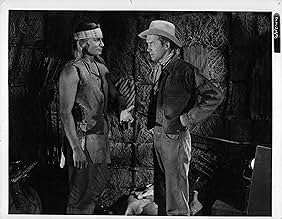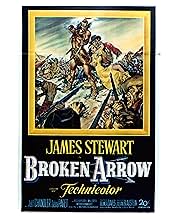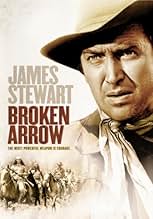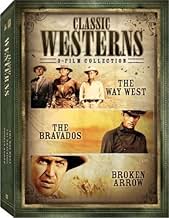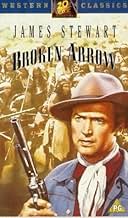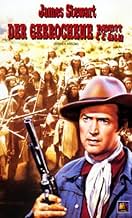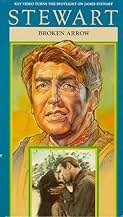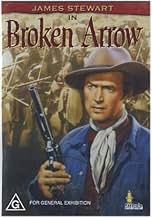IMDb-BEWERTUNG
7,1/10
10.461
IHRE BEWERTUNG
Tom Jeffords versucht, Frieden zwischen Siedlern und Apachen zu stiften.Tom Jeffords versucht, Frieden zwischen Siedlern und Apachen zu stiften.Tom Jeffords versucht, Frieden zwischen Siedlern und Apachen zu stiften.
- Regie
- Drehbuch
- Hauptbesetzung
- Für 3 Oscars nominiert
- 4 Gewinne & 6 Nominierungen insgesamt
Joyce Mackenzie
- Terry
- (as Joyce MacKenzie)
Robert Adler
- Lonergan - Stage Driver
- (Nicht genannt)
Trevor Bardette
- Stage Passenger
- (Nicht genannt)
Chris Willow Bird
- Nochalo
- (Nicht genannt)
Raymond Bramley
- Col. Bernall
- (Nicht genannt)
Chet Brandenburg
- Miner
- (Nicht genannt)
Argentina Brunetti
- Nalikadeya - Cochise's Wife
- (Nicht genannt)
Harry Carter
- Miner
- (Nicht genannt)
Iron Eyes Cody
- Teese
- (Nicht genannt)
J.W. Cody
- Pionsenay - Chosen Warrior
- (Nicht genannt)
Heinie Conklin
- Townsman
- (Nicht genannt)
Dolores Christine Cypert
- American Indian
- (Nicht genannt)
- …
Empfohlene Bewertungen
While I have seen better westerns, I was really impressed with Broken Arrow. Not just because it is a very good film, but it is also different. While a lot of westerns deal with themes(some complex, some not so much)such as revenge and betrayal, Broken Arrow is a very poetic and elegiac film that you can see perfectly in how the story is constructed. Also the Indians here are portrayed as those in want of freedom with their families, which I found refreshing, seeing as I have seen them portrayed as quite brutal. Broken Arrow is a beautifully photographed film, the script flows nicely and is thought-provoking and the score is very stirring. The acting is fine, Debra Paget, breathtakingly-beautiful she is, and her scenes with Stewart are touching, is good but I couldn't help thinking they could have cast someone older. James Stewart is very believable in one of his better western performances, while Jeff Chandler gives the best performance of his career here and also the best performance of the movie too. All in all, excellent and very moving film. 8/10 Bethany Cox
Although the story is entertaining and the performances of James Stewart, Jeff Chandler and Debra Paget outstanding, what makes Broken Arrow a landmark film is its portrayal of the Apache Indians as something more than savage killers. Indians in the movies were always seen as brutal and inhuman. Here they are seen as people who want what the "white men" wanted: to live in freedom with their families on their own land and to live their lives in their own way.
Jeff Chandler is terrific as Apache leader Cochise, who he would play twice more in other films. There is a moving scene when they return from battle and he recites the names of those killed with a pained look in his eyes. Cochise and Stewart's character have a relationship which grows from mutual respect to a true friendship as they try to work out peace between the whites and indians. Stewart is looked on as a traitor by his friends and things are complicated further by his relationship with the young Apache girl played by Debra Paget.
I cannot think of another western in which indians have been portrayed as real people with emotions who hurt, who love. When this film was released 50 years ago, blacks, asians and American Indians were still being portrayed using the worst kinds of racial stereotypes.
Jeff Chandler is terrific as Apache leader Cochise, who he would play twice more in other films. There is a moving scene when they return from battle and he recites the names of those killed with a pained look in his eyes. Cochise and Stewart's character have a relationship which grows from mutual respect to a true friendship as they try to work out peace between the whites and indians. Stewart is looked on as a traitor by his friends and things are complicated further by his relationship with the young Apache girl played by Debra Paget.
I cannot think of another western in which indians have been portrayed as real people with emotions who hurt, who love. When this film was released 50 years ago, blacks, asians and American Indians were still being portrayed using the worst kinds of racial stereotypes.
As the war rages between the American settlers and the Apache, former soldier Tom Jeffords happens upon a young Indian wounded after an attack. Taking upon himself to aid the boy, it's not long before the Apache show up intent on killing Jeffords by way of the war instincts. Pleading for Jeffords' life, the boy manages to get him spared by the Apache chief, Cochise. It's the start of a friendship that may just bring and end to the war and peace across the west.
Tho not the first "social" Western film made, Broken Arrow, it can be argued, is maybe one of the most important and telling genre films of the 50s. Showing humanist portrayals of the Apache and dealing out level headed tellings of the relationships between whites and the Native Americans, Delmer Daves' film is as relevant today as it was back on release. Adapted from Elliott Arnold's novel Blood Brother, the story follows Jeffords (a measured and fine James Stewart) as he attempts to broker peace between the warring factions. Firstly by convincing Cochise (Jeff Chandler bang on form) to allow the mail run thru the pass, something that brings suspicion and calls of Indian lover from Jeffords' own kind, and then to finally set up a peace pact at a time when violence and hatred was rife in the west.
As the friendship between the two men grows, Jeffords and an Apache girl fall in love (beautiful Debra Paget as Sonseeahray), thus giving the story a further jolt of momentum. The screenplay then really hits its stride, as Daves and his crew pit peace and inter racial love against a backdrop of bloodshed and savagery. Never glossing over just how hard peace is going to be, Broken Arrow retains intelligence and a sensitivity even as breakaway factions from both sides (for example we see Geronimo split the Apache and form a renegade front) are intent on killing off the peace process. It even has time for deep emotional kickers to reinforce the point of just how tough and unlikely peace and tolerance can be sometimes.
Broken Arrow was, and still is, a bold picture. In fact it can be argued that for the likes of Daves and Stewart, it was at the time very bold and risky career moves. But it paid off because the film stands up today as a picture of some distinction. It's themes and approach to its subjects are something that this generation, and all the future ones, will always find to be socially important. Boosted by Hugo Friedhofer's luscious score and taking advantage of the Lone Pine location shoot, Broken Arrow is a fine fine film that even non Western fans should be looking to absorb. 8/10
Tho not the first "social" Western film made, Broken Arrow, it can be argued, is maybe one of the most important and telling genre films of the 50s. Showing humanist portrayals of the Apache and dealing out level headed tellings of the relationships between whites and the Native Americans, Delmer Daves' film is as relevant today as it was back on release. Adapted from Elliott Arnold's novel Blood Brother, the story follows Jeffords (a measured and fine James Stewart) as he attempts to broker peace between the warring factions. Firstly by convincing Cochise (Jeff Chandler bang on form) to allow the mail run thru the pass, something that brings suspicion and calls of Indian lover from Jeffords' own kind, and then to finally set up a peace pact at a time when violence and hatred was rife in the west.
As the friendship between the two men grows, Jeffords and an Apache girl fall in love (beautiful Debra Paget as Sonseeahray), thus giving the story a further jolt of momentum. The screenplay then really hits its stride, as Daves and his crew pit peace and inter racial love against a backdrop of bloodshed and savagery. Never glossing over just how hard peace is going to be, Broken Arrow retains intelligence and a sensitivity even as breakaway factions from both sides (for example we see Geronimo split the Apache and form a renegade front) are intent on killing off the peace process. It even has time for deep emotional kickers to reinforce the point of just how tough and unlikely peace and tolerance can be sometimes.
Broken Arrow was, and still is, a bold picture. In fact it can be argued that for the likes of Daves and Stewart, it was at the time very bold and risky career moves. But it paid off because the film stands up today as a picture of some distinction. It's themes and approach to its subjects are something that this generation, and all the future ones, will always find to be socially important. Boosted by Hugo Friedhofer's luscious score and taking advantage of the Lone Pine location shoot, Broken Arrow is a fine fine film that even non Western fans should be looking to absorb. 8/10
Released in 1950 and directed by Delmer Daves, "Broken Arrow" stars Jimmy Stewart as a former soldier, Tom Jeffords, who saves an Apache teen after ten years of war between settlers and Natives in 1870, Arizona. When the boy's elders extend him mercy Jeffords sees the Apaches as human beings rather than faceless enemies for the first time and becomes the mediator between the warring factions. Jeff Chandler is stunning as the Apache leader, Cochise, but Debra Paget, only 16 years-old during filming, looks too whitebread to be believable. I love Debra, but casting her in this role is eye-rolling. To the film's credit, several of the peripheral Apache characters are played by Native Americans, including Jay Silverheels and John War Eagle.
The emphasis is on the Apache way of life and the movie is touted as the first pro-Indian Western ("pro-Indian" to a point), but this simply isn't the case. "Buffalo Bill" with Joel McCrea came out six years earlier and it was clearly favorable toward the Natives. "Broken Arrow" just goes a little further in this direction. Regardless, it is amazing to view Westerns from this long ago that are evenhanded regarding the Indian Wars, honestly portraying the Natives as hostile and formidable, but also with respect to their perspective and way of life. While obviously dated in some respects, both "Buffalo Bill" and "Broken Arrow" stand the test of time and remain entertaining and even enlightening to this day.
The movie runs 93 minutes and was shot in Arizona, but also Iversion Ranch & Alabama Hills, California.
GRADE: B+ or A-
The emphasis is on the Apache way of life and the movie is touted as the first pro-Indian Western ("pro-Indian" to a point), but this simply isn't the case. "Buffalo Bill" with Joel McCrea came out six years earlier and it was clearly favorable toward the Natives. "Broken Arrow" just goes a little further in this direction. Regardless, it is amazing to view Westerns from this long ago that are evenhanded regarding the Indian Wars, honestly portraying the Natives as hostile and formidable, but also with respect to their perspective and way of life. While obviously dated in some respects, both "Buffalo Bill" and "Broken Arrow" stand the test of time and remain entertaining and even enlightening to this day.
The movie runs 93 minutes and was shot in Arizona, but also Iversion Ranch & Alabama Hills, California.
GRADE: B+ or A-
In this underrated Western, Stewart is an ex-scout who tries to make peace between the Apaches and the white settlers in 1870s Arizona. For some reason this film's reputation has taken a hit over the years, but it is quite enjoyable. Stewart made several Westerns in the 1950s, starting with this and "Winchester 73" in 1950. Although the latter film is more highly regarded today, this film is actually better crafted, boasting fine cinematography and score. Chandler gives perhaps the best performance of his career as the noble Apache chief who is willing to make peace. Paget (looking like Britney Spears!) plays Stewart's love interest.
Wusstest du schon
- WissenswertesThe broken arrow, which signals an end to fighting, is in fact a Blackfoot Indian symbol, not an Apache symbol. The Blackfoot are native to Montana and Alberta, Canada.
- PatzerWhen General Howard is beginning to pick himself off the ground after the Apache attack on the military wagon train, the first shot shows the ground to be mostly desert sand, with very little vegetation, but when the scene jumps to a long shot of the General getting up, the ground around him is almost entirely covered with green vegetation, showing scarcely any sand at all.
- VerbindungenFeatured in Family Classics: Family Classics: Broken Arrow (1963)
Top-Auswahl
Melde dich zum Bewerten an und greife auf die Watchlist für personalisierte Empfehlungen zu.
- How long is Broken Arrow?Powered by Alexa
Details
Box Office
- Weltweiter Bruttoertrag
- 10.145 $
- Laufzeit
- 1 Std. 33 Min.(93 min)
- Seitenverhältnis
- 1.37 : 1
Zu dieser Seite beitragen
Bearbeitung vorschlagen oder fehlenden Inhalt hinzufügen


